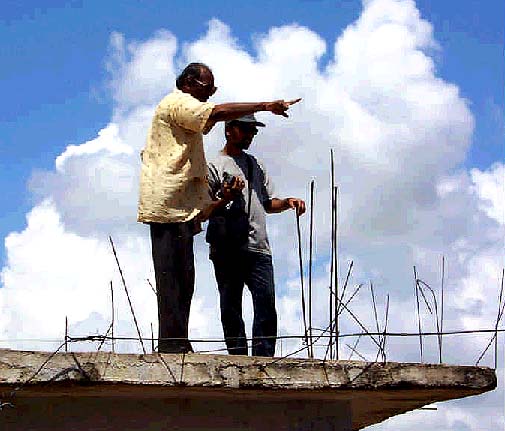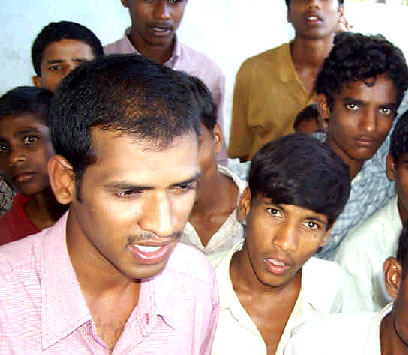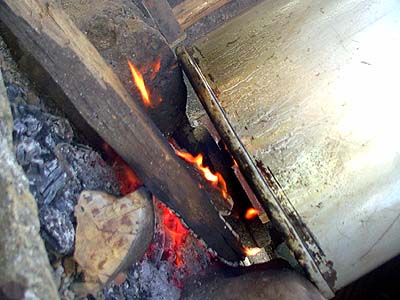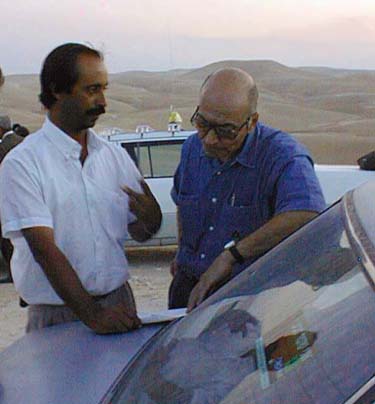|

Development of a Greenstar site is a collaborative process between Greenstar, several co-operating players, and the people of the village; the people of the village make the final decisions. Many of the ideas here came from Dr. Nagendra Swamy (shown above during a survey for Greenstar). Dr. Swamy is a renowned leader of rural communities, or "mandels", in central India; see his paper, Villages in Partnership. This process is not intended as a rigid formula; rather it is more like a cookbook of preferred and likely ingredients in developing a Greenstar digital culture site. In the real world, every site will be unique in its process. We get hundreds of suggestions for possible sites. Only a small minority of our possible sites makes the initial cut to become qualified contacts. That initial cut, accompanied by in-depth research through our international contacts, and through personal connections with people in the host country, is described at http://www.e-greenstar.com/site-selection/. We almost always ask that people in the village participate in writing a narrative that addresses these selection criteria briefly, point by point. When we have made a preliminary selection of a site, we conduct a 1-2 day site visit with a qualified contact, to see for ourselves that what we have researched is correct, to meet the intermediaries and key people in the village, to let them know the range of potential activities we might fund in their community, and to get them started in thinking about digital culture activities, and about energy, telecomm, health and education needs. 
On the basis of this visit, and subsequent research and verification, we decide whether Greenstar is going to invest in the future of the village and its people. To this point, we have spent a few weeks of internal time, and some travel expenses. Not every community thus evaluated makes the Greenstar cut to the next stage, a "committed investment." Some time after the initial site visit, we send two people to the site for further development work. The objective of this 4-day trip is threefold: to identify the biggest hopes, problems and opportunities of the people of the village; to introduce our technical toolkit; and to introduce our platform potentials -- the other organizations, both local and international, which may contribute elements of the project. We involve all the people in these discussions, not just the evident leaders. All the leaders, not just the clan heads or political people. We conduct all meetings with one of the intermediaries we have chosen. We ask a few simple questions, noting and recording the responses. It's very informal, hands-on, very personal; a lot of this is done over meals, and we help to sponsor music and artwork from the people, making some basic field recordings for reference, to create a festival atmosphere. A letter introducing this phase of activity is provided here as a sample of this stage of the process, and the type of interaction it generates. This letter was sent to His Majesty Otumfuo Osei Tutu II, the traditional King of the Ashanti in Ghana. His Majesty is an influential political, cultural and religious leader in the region. For these meetings, we have in hand a broad technical toolkit, and describe to the people what each piece can do in their village (showing them concrete examples of what has been done in other Greenstar villages, wherever possible) and what benefit it might have to them. We note and record their responses. 
We also introduce an even broader platform toolkit, showing the people what other groups, allied with Greenstar, might be able to supply if timing, budget and opportunity show themselves. We let them know that these extra capabilities might be available if our first partnership with them is successful, to build on that foundation. We're careful not to make promises in these areas. A key notion must come out of this process clearly to everyone: Greenstar is not the complete, final answer to all development needs in a community...but we can be the first step, the catalyst and the connector, and we can deliver some critical needed infrastructure. We're not rich people looking to make a few donations and help them out. We're people who believe in their community and its potential to be independent, to build their own future, and we can provide some tools, and some income, in return for their co-operation in creating a digital culture experience to share the community's voice and vision with the world. This three-track conversation is all done in three intensive days in the village. Some of the meetings are with large groups; some with smaller subgroups (the school, the clinic, the elders, etc.), some with key individuals; some simply with families. We spend a fourth day absorbing, noting, organizing. At the end of the fourth day, we present to all the people what we think we've heard, organized in a straightforward way, and ask for their responses, confirmations, critiques and questions. We make sure that we heard what they said, and that they know that we heard it. Then we retire from the scene...we don't get involved in debates, discussions and decisions, or even make recommendations. Every community has its own political and personal issues, especially when dealing with outsiders, and planning for the future. We respect those boundaries, and don't walk within them. 
If we've done our job, the leadership of the community will guide the people to reasonable decisions. They know enough now to design the Greenstar Solar-Powered Community Center that is best for them. We stand by to answer their final questions, and figure out the practical realities of what they want...compared to what we can deliver in our budget. We may not be able to deliver everything they want right away, but we will be able to deliver a critical subset of what they need. And work for more in the future. Then we present the community with a written plan, an agreement for everyone to endorse, a set of commitments we're making to them and them to us, and a timeline. Everyone sees this short plan, written in layman's language; it is summarized in a few high-level principles and made into a poster that is posted in and around the village. It is read aloud to a community meeting, to which everyone is invited. If all goes well, Greenstar and the people of the village now have a solid partnership, and a level of personal trust -- a commitment to work together for mutual benefit, and a strong consensus by everyone to participate.  |